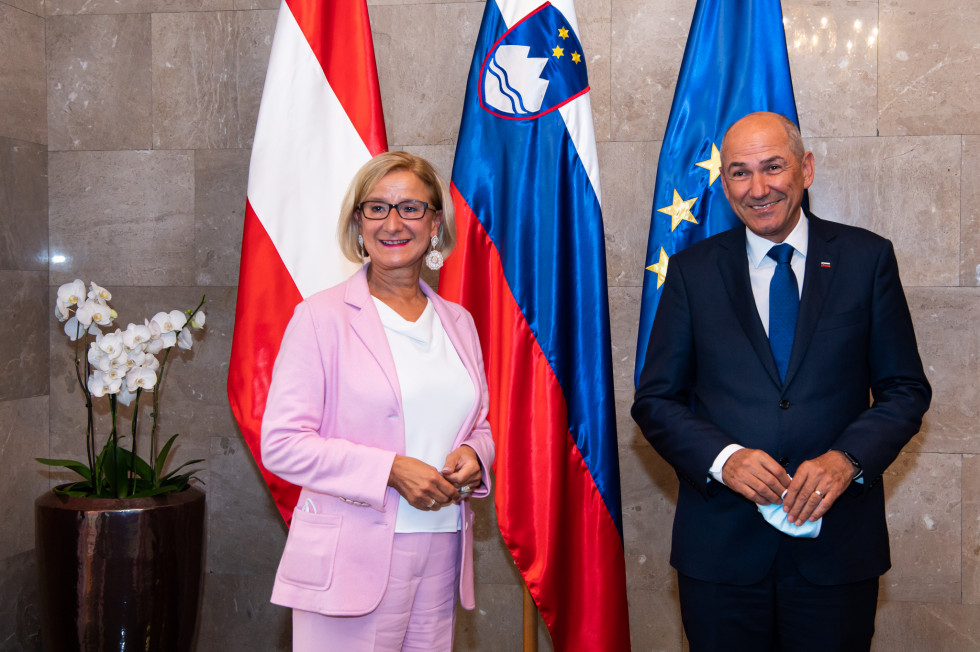By: UKOM
Yesterday, Prime Minister Janez Janša met with Governor of Lower Austria Johanna Mikl-Leitner at a working lunch. The two discussed the COVID-19 situation on both sides of the border and the priorities of the Slovenian Presidency of the Council of the EU.
After the meeting, Prime Minister Janša made a statement to the Austrian media, in which he emphasised that the cooperation between Slovenia and Austria is excellent. “Austria is practically Slovenia’s largest investor; there are nearly 1,000 companies in Slovenia that are owned or co-owned by Austrians, and we are very pleased that many of these companies are involved in the green and digital transformation, which is also one of the topics we covered in today’s talks,” said the Prime Minister, adding that Slovenia had prepared a comprehensive plan to support the green and digital transition and had recently established the Ministry of Digital Transformation. “We have agreed to share and exchange experiences in both areas,” the Prime Minister said.
During the working lunch, the two sides also discussed topical issues relating to the Slovenian Presidency of the Council of the EU, namely the situation in Afghanistan, the problems arising from the very probable upcoming migratory pressure on Europe due to the situation in Afghanistan, as well as other issues on the Slovenian Presidency’s agenda, in particular those regarding the future of Europe, with the conference on the future of Europe taking place at the moment, while most of the discussions planned during the Slovenian Presidency of the Council of the EU will be taking place in the second half of the year.
“We also touched on the current situation of the COVID-19 pandemic and its consequences. I congratulated the Governor on the good results in terms of vaccination rates,” said the Prime Minister, adding, “Unfortunately, Slovenia is not there yet. However, we are striving to achieve the highest possible vaccination coverage to prevent the worst consequences of the fourth and fifth waves Europe is currently facing.”
Asked by an Austrian journalist about Slovenia’s renewable energy sources and the partnership with Austria in this regard, the Prime Minister said that the climate goals set by the EU, and thus by Slovenia and Austria, will present a challenge. “Particularly for Slovenia, as the share of renewable energy in Austria’s national energy mix is very high, while in Slovenia it is relatively low. We would like to adopt Austria’s good practices, especially those relating to maximising the use of solar and wind energy. These are the two areas where we look forward to a particularly close cooperation in the future,” underlined Prime Minister Janša.
Asked about the Krško Nuclear Power Plant, the Prime Minister said that nuclear energy accounts for 38% of Slovenia’s energy mix, which is why “Slovenia cannot function without this energy”. “For how long we will need to use nuclear energy in the future depends mainly on how successful we are in securing other energy sources. This is the key question. As things stand, Slovenia’s energy mix cannot survive without nuclear energy. However, we are counting on the coming years and decades to bring technological breakthroughs and make this issue more straightforward,” the Prime Minister said, reiterating that Slovenia’s share of renewable energy in the energy mix is significantly smaller than Austria’s and “Slovenia is therefore faced with a different situation”.

